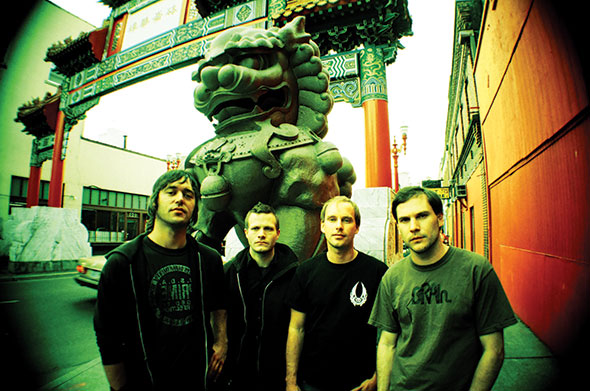Portland’s most enigmatic psych-troupe orbits beyond experimental parameters

It seems like just about every city has its crowning moment in music history. Simply consider any predictable VH1 retrospective on ’60s San Francisco or throwback story about the emergence of punk in New York City. But like any great city, there are always a few bands or artists that hide in the shadows, far from the surface of a recognizable “scene.” Take for instance, Portland-based tripper outfit, Grails. While a portion of the city’s bands and artists take refuge in effect-based pedal riffing, Grails approaches its psychedelia from a different wavelength altogether. Molding together the finest moments of epic ambient, hazy drones and blistering psych-rock, the band has rekindled the spirit and experience of a number of genres—be it stony metal, noise or traditional leftfield.
That said there’s a lot more to Grails’ unique status amongst its psychedelic peers than merely residing in Portland and having an appreciation for ambience. One needn’t look further than the band’s label history. After composing a demo, the band sent it out to a few select labels, one of them being the legendary Bay Area outfit: Neurosis-run label, Neurot Recordings. “Steve Von Till is directly responsible for the existence of the band,” says founding member Alex Hall. “It was a crazy day, I just about busted through my seat and Emil said he could actually hear me punching through walls. It changed the band’s trajectory since then.” The group’s 2003 debut, The Burden of Hope, set the band apart as a melancholic post-rock force quite on par with its label mates Neurosis, Current 93 and Amber Asylum.
Since then, the band has managed to achieve a catalogue on par with that of bands who have been in existence for a decade or more. Recording for labels as diverse as experimental imprint Important Records, post-metal mainstay Robotic Empire, and most recently, Temporary Residence. Unlike a majority of Portland experimentalists flirting within their own label circles, Grails prides itself on moving outside of the genre-box in favor of exposing its sound to subcultures from all over the map. “We grew up listening to a lot of metal and hardcore—like Neurosis, the Melvins, and Gilman Street stuff,” Hall says. “But we all grew up in different scenes in different towns, so we all listen to totally different stuff, really.” And that ability to reach an array of listeners is reflected in the band’s latest album, The Doomsdayer’s Holiday (Temporary Residence). “It’s part of our band’s DNA,” explains Amos. “We meet people all the time who like Grails, but have never heard of OM. We need to be aware of those ghettos of listenership, so we work with different people knowing that it’s reaching tons of different people. It’s a way to unify and integrate underground listeners.”
Aside from incorporating a fleet of different instrumentation and vibes from analog synths to Middle-Eastern trips to blistering guitar-driven brutality, the band also ushered in some noteworthy collaborators for the 18 month-in-the-making album. Featuring production credits from Faust-collaborator, Steven Wray Lobdell, and Earth/Sunn O))) producer, Randall Dunn, the album is light years away from the band’s always-evolving sound. “It’s like looking through scat to see what we’ve been eating,” Hall says. “A lot of the record was written on the spot and we went in with more of a vague skeleton,” chimes in Amos. “A big part of the Grails method is that we try to come in to the studio with an incomplete satisfying structure, so that the song is kind of written in mixing. We try to take our structure and flip it upside-down, basically remix it like some Techno artist, and turn it into a mutated, corroded, disturbed version of the original song. It’s kind of a beast.”
In addition to the Grails’ unconventional songwriting process, the band paid homage to its experimental history by inviting the iconic Portland-based musician Alan Bishop, best known for his work with Sun City Girls. “Up here in Seattle and Portland, there’s a small community of musicians who play together. Alan is part of this laid-back group of people who play on each other’s records,” continues Amos. “We look at Alan as a sort of father figure for this type of movement.” And just as bands like Earth, Sunn O))) and others often collaborate together, Grails too finds solace in this communal music format. Amos himself doesn’t only play in Grails, but is also a part of perhaps the most intense heavy bands of the past decade, OM. Alongside ex-Sleep member Al Ciseneros, Amos engages his lust for dub, Pink Floyd and Billy Cobham through the always repetitive, and above all, loud project.
From the cinematic, Pink Floydian leanings of “Acid Rain” to the beautiful acoustic guitar-laden soundscape of “The Natural Man,” to the near prog-leanings of “Predestination Blues,” Doomsdayer’s Holiday authentically captures Grails at its most realized and mature, and displays the after-effects of hardcore, noise and once-fresh sub-cultural scenes. Far from geographical location or narrow genre classifications, Grails’ exploration continues beyond the amalgam of influences into a dimension all its own. fred miketa

